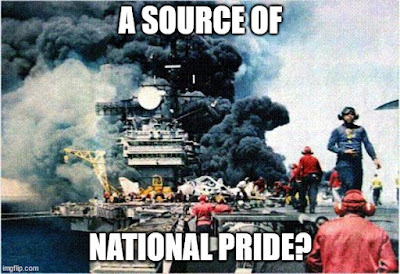The carrier debate used to be whether they were vital for national security or an expensive target. So this is a new standard for the carrier debate: "source of national pride--or a ludicrous waste of money?"
Funny that is the question isn't "useful or waste," eh?
Aircraft carriers have been around since the First World War. If the usual laws of military Darwinism applied, they would be extinct by now, gone the way of the battleship which was eventually just too costly, resource-hungry and vulnerable to survive. But no. The carrier is flourishing. Fourteen navies operate them. The US has 11. They have become as much a national phallic symbol as Dreadnoughts were at the start of the last century – and they attract the same sort of controversy.
You know my view on the Ford class. And about carriers in general, of course. I worry a lot about the morale effect of seeing even one of our carriers on fire.
But the question of usefulness is complicated and rarely addressed in the carrier debate:
Carriers have responsibilities in two areas: power projection and sea control.
Power projection is what we've done with our carriers since world War II. Sail them off the coast of some country that doesn't possess a potent navy or air force, and use it as a floating air base. Without the need to fight for control of the sea, we exercise that control of the sea from the start of a conflict. We've done this a lot. And the carriers have performed superbly.
This history of power projection is what the defenders of carriers point to.
But what the anti-carrier side points to is usually the sea control mission. In this mission, by definition we face a nation with a navy and air force capable of fighting us for control of the seas--or at least denying us full control.
And for nations without carriers, advances in persistent surveillance and guided missiles give them a potent weapon to use against our big carriers.
Further, while defenders of carriers like to call them sovereign pieces of American real estate that can host our planes, unlike actual real estate, our carriers float and therefore can sink. Or just burn and become mission kills. Really.
Even in an age of great power competition, the power projection mission is still viable. Whether against smaller powers, for noncombat missions, or against a major power after smashing up their anti-ship capabilities.
But big deck carriers no longer deserve their place of honor in the fleet when an enemy (that is, China) can contest the Navy for control of the seas, whether in general or locally. Even if we protect them, what resources do we need to devote to protecting them? And what sea-control capabilities have we lost by building and protecting the carriers?
It will be interesting to see if China sees their developing carrier force as an asset for power projection or sea control.
The scale at which we build large carriers is a waste (and no, smaller carriers aren't better). And national pride is not built on flaming wreckage.
What I really want is not a revised carrier debate but a sea power debate.


